#lok sabha election
Explore tagged Tumblr posts
Text
0 notes
Text
Out on parole, Amritpal Singh, Engineer Rashid take oath as LS members
NEW DELHI — Jailed radical Sikh preacher Amritpal Singh and Kashmiri leader Sheikh Abdul Rashid, who were granted parole to take oath as members of the Lok Sabha, were sworn in as MPs on Friday, amid heavy deployment of security personnel in and around the Parliament complex. While Rashid, popularly known as Engineer Rashid, is in Delhi’s Tihar jail in a militant funding case registered under the…
0 notes
Text
Analysis on the Lok Sabha Election: यह जनादेश किसकी जीत किसकी हार? 10 साल बाद लौट रहा गठबंधन सरकार का दौर

Analysis of the Lok Sabha Elections: #1 इस जनादेश के क्या मायने ��ैं?
एनडीए को 400 पार और पार्टी को 370 पार ले जाने की भाजपा की रणनीति कामयाब नहीं हो पाई।.
जनादेश बताता है कि गठबंधन की अहमियत का दौर 10 साल बाद फिर लौट आया है। भाजपा के पास अकेले के बूते अब वह आंकड़ा नहीं है, जिसके सहारे वह अपना एजेंडा आगे बढ़ा सके।
जनादेश ने साफ कर दिया कि सिर्फ प्रधानमंत्री मोदी के चेहरे के भरोसे रहने से भाजपा का काम नहीं चलेगा। उसके निर्वाचित सांसदों और राज्य के नेतृत्व को भी अच्छा प्रदर्शन करना होगा।
एग्जिट पोल्स की भी हवा निकल गई। 11 एग्जिट पोल्स में एनडीए को 340 से ज्यादा सीटें मिलने का अनुमान लगाया था। तीन सर्वेक्षणों में तो एनडीए को 400 लोकसभा सीटें मिलने का अनुमान था। रुझानों/नतीजों में एनडीए उससे तकरीबन 100 सीट पीछे है।
2# क्या इसे सत्ता विरोधी लहर कहेंगे?
1999 में 182 सीटें जीतने वाली भाजपा जब 2004 में 138 सीटों पर आ गई तो उसने सत्ता गंवा दी। उसके पास स्पष्ट बहुमत 1999 में भी नहीं था और उससे पहले भी नहीं था। 2009 में कांग्रेस इससे बढ़कर 206 सीटों पर पहुंच गई, लेकिन 2014 में 44 पर सिमट गई। इसे स्पष्ट तौर पर यूपीए के लिए सत्ता विरोधी लहर माना गया। फिर भी यह माना गया कि जनादेश भाजपा के 'फील गुड फैक्टर' के विरोध में था।वहीं, 2004 में भाजपा से महज सात सीटें ज्यादा यानी 145 सीटें जीतकर कांग्रेस ने यूपीए की सरकार बना ली।
हालांकि,यहां भाजपा 34-35 सीटों पर सिमटती दिख रही है, जबकि 2014 में यहां भाजपा ने 71 और 2019 में 62 सीटें जीती थीं। जब उत्तर प्रदेश जैसे सबसे अहम राज्य के नतीजे देखते हैं तो तस्वीर इस बार अलग नजर आती है। सबसे बड़ा नुकसान भाजपा को इसी राज्य से हुआ है।
3# क्या कम मतदान ने भाजपा की सीटें घटा दीं और कांग्रेस-सपा की बढ़ा दीं?
वैसे तो इस बार लोकसभा चुनाव के शुरुआती छह चरण में ही पिछली बार के मुकाबले ढाई करोड़ से ज्यादा वोटरों ने ���तदान किया था।क्योंकि भाजपा को पसंद करने वाले वोटरों ने तेज गर्मी के बीच संभवत: खुद ही यह मान लिया कि इस बार भाजपा की जीत आसान रहने वाली है। फिर भी मतदान का प्रतिशत क�� रहा। इसके ये मायने निकाले जा रहे हैं|इसलिए वोटरों का एक बड़ा तबका वोट देने के लिए निकला ही नहीं। कि भाजपा अब की पार 400 पार के नारे में खुद ही उलझ गई। उसके वोट इसलिए नहीं बढ़े |
4# तो यह किसकी जीत, किसकी हार? यह BJP की स्पष्ट जीत नहीं है। यह NDA की जीत ज्यादा है। आंकड़ों की दोपहर तक की स्थिति को देखें तो यह माना जा सकता है| नीतीश कुमार और चंद्रबाबू नायडू, दोनों ही अतीत में एनडीए से अलग हो चुके हैं।इंडी गठबंधन की बात करें तो यह उसकी स्पष्ट जीत कम और बड़ी कामयाबी ज्यादा है। इन दोनों दलों के बारे में यह कहना मुश्किल है कि ये भाजपा के साथ पूरे पांच साल बने रहेंगे या नहीं। कि पूरे पांच साल भाजपा गठबंधन के सहयोगियों खासकर जदयू और तेदेपा के भरोसे रहेगी। राज्य के लिए विशेष पैकेज और केंद्र और प्रदेश की सत्ता में भागीदारी के मुद्दे पर इनके भाजपा से मतभेद के आसार ज्यादा रहेंगे। यह गठबंधन 200 का आंकड़ा आसानी से पार कर रहा है। इसके ये सीधे तौर पर मायने हैं कि अगले पांच साल विपक्ष केंद्र की राजनीति में मजबूती से बना रहेगा। क्षेत्रीय दल देश की राजनीति में अपरिहार्य बने रहेंगे।
5# मुकाबला भाजपा बनाम विपक्ष था या मोदी बनाम मोदी?
आंकड़ों की मानें तो इसका जवाब है हां, लेकिन इसका दूसरा जवाब यह भी है पहली बार में ही वह अकेले के बूते 282 सीटों पर पहुंी। In 2019, 303 सीटें जीतीं। कि यह मुकाबला 2014 और 2019 में मोदी की लोकप्रियता बनाम 2024 में मोदी की लोकप्रियता का रहा। भाजपा ने नरेंद्र मोदी के चेहरे पर पहली बार 2014 का लोकसाा चुनाव लड़ा था। भाजपा ने इस बार भाजपा की अपनी सीटें 240 के आसपास हैं। यानी वह 2014 से 40 सीटें और 2019 से 60 सीटें पीछे है।
6# तो क्या गठबंधन की राजनीति लौट रही है?
बिल्कुल, भाजपा ने 10 साल स्पष्ट बहुमत से सरकार चलाई, लेकिन अब गठबंधन सरकार का दौर लौटेगा। भाजपा को भले ही पांच साल तक आसानी से सरकार चला लेने का भरोसा हो, लेकिन उसकी निर्भरता जदयू और तेदेपा जैसे दलों पर रहेगी।
7# पिछली गठबंधन सरकारों के मुकाबले भाजपा किस स्थिति में रहेगी?
डॉ. मनमोहन सिंह के समय कांग्रेस ने इससे भी कम सीटें लाकर गठबंधन की सरकार चलाई। अटल-आडवाणी भी भाजपा को अधिकतम 182 सीटों पर पहुंचा सके थे, लेकिन सरकार चला पाए। भाजपा की 2024 की स्थिति इससे बेहतर है।
8# यह जनादेश कबकी याद दिलाता है?
1991 नतीजे के लोकसभा चुनाव जैसे हैं। 232 सीटें जीतीं और पीवी नरसिंहा राव प्रधानमंत्री बने। उन्होंने पूरे पांच साल अन्य दलों के समर्थन से सरकार चलाई। इस बार भाजपा भी 240 के आसपास है। गठबंधन अब उसकी मजबूरी है।
9# यह चुनाव किसके लिए उत्सा��जनक हैं?
इसके पीछे कई चेहरे हैं। जैसे राहुल गांधी। कांग्रेस 2014 में 44 और 2019 में 52 सीटों पर थी तो उन्हें जिम्मेदार माना गया। इस बार वह 100 सीटों के करीब है। देशभर में भाजपा को सबसे बड़ा झटका सपा ने ही दिया है। सपा ने पिछली बार बसपा के साथ गठबंधन किया। यानी पिछली बार के मुकाबले लगभग दोगुनी सीटों पर वह जीत रही है।दूसरा बड़ा नाम है अखिलेश यादव।बसपा को 10 सीटें मिली थीं, लेकिन सपा पांच ही सीटें जीत पाई थी। इस बार सपा ने कांग्रेस से हाथ मिलाया। । 2004 के लोकसभा चुनाव में उसे 35 सीटें मिली थीं। वह 34 से ज्यादा सीटों पर जीत रही है। यह लोकसभा चुनावों में वोट शेयर के लिहाज से सपा का अब तक का सबसे अच्छा प्रदर्शन हो सकता है वहीं, वोट शेयर के लिहाज पार्टी का सबसे बेहतर प्रदर्शन 1998 में था जब उसे करीब 29 फीसदी वोट मिले थे। इस बार यह आंकड़ा 33 फीसदी से ज्यादा हो सकता है।
तीसरा बड़ा नाम हैं चंद्रबाबू नायडू। उनकी तेदेपा आंध्र प्रदेश में सरकार बनने के करीब है और एनडीए के सबसे अहम घटक दलों में से एक रहेगी।
ऐसा ही एक नाम उद्धव ठाकरे का है। यह उनके लिए अस्तित्व की लड़ाई थी। शिंदे गुट से ज्यादा सीटें जीतकर उद्धव ठाकरे यह कहने की स्थिति में होंगे कि उनकी शिवसेना ही असली शिवसेना है।
10# इस बार क्या रिकॉर्ड बन सकते हैं?
इस बार का लोकसभा चुनाव भले ही सुस्त नजर आया, लेकिन जनादेश ऐतिहासिक हो सकता है। अगर भाजपा ही सरकार बनाती है तो यह प्रधानमंत्री नरेंद्र मोदी की हैट्रिक होगी। पीएम मोदी पंडित जवाहरलाल नेहरू के बाद वे ऐसे दूसरे नेता होंगे, जो लगातार तीसरी बार प्रधानमंत्री बनेंगे। 1947 में पंडित नेहरू पहली बार प्रधानमंत्री जरूर बने, लेकिन चुनावी राजनीति शुरू होने के बाद उन्होंने 1951-52, 1957, 1962 का चुनाव जीता और लगातार प्रधानमंत्री रहे। वहीं, शपथ लेने के बाद प्रधानमंत्री मोदी अटलजी की भी बराबरी कर लेंगे। अटलजी का कार्यकाल कम रहा, लेकिन उन्होंने तीन बार प्रधानमंत्री पद की शपथ ली थी। more.
#Analysis on the Lok Sabha Election#Lok Sabha Election#lok sabha elections#rahul gandhi#narendra modi#pm modi#indian politics#election#lok sabha election results#election 2024
0 notes
Text
Haryana Lok Sabha Result 2024 [4 June]
Haryana Lok Sabha Result 2024 – लोकसभा चुनाव 2024 की गिनती पूरी हो चुकी है और BJP या कांग्रेस ने _______ सीटों के साथ विजय प्राप्त की है। आज इस लेख में हम हरियाणा लोकसभा चुनाव परिणाम 2024 पर चर्चा करेंगे। अगर हम हरियाणा के राजनीतिक परिदृश्य की बात करें, तो यहां BJP और INC प्रमुख दावेदार हैं। हालांकि, पिछले कुछ वर्षों में हमने देखा है कि भारतीय जनता पार्टी (BJP) ने भी प्रमुखता हासिल की है।…

View On WordPress
#election 2024#haryana lok sabha election#lok sabha election#lok sabha election 2024#lok sabha election result 2024#lok sabha elections in india 2024#lok sabha elections in india 2024 dates#result 2024
0 notes
Text
youtube
#Indian Elections#Politics in India#Indian Economy#Indian Society#Media Bias#Voter Education#Foreign Policy#Trade Deficit#Brain Drain#English Language in India#Indian Democracy#Over-taxation#Petrol Prices#Rupee Value#empire diaries#ratnasradar#lok sabha election#election#election 2024#joe biden#politics#history#Youtube
0 notes
Text
"Doodle Democracy: Google Celebrates the Lok Sabha Election 2024 in India"
Doodle Democracy: Google Celebrates the Lok Sabha Election 2024 in India (Twitter image jpeg) Lok Sabha election, Google Doodle, democracy celebration, 2024 election, India Discover the colorful Google Doodle celebrating India’s Lok Sabha Election 2024 – a tribute to democracy in vibrant India. Dive into this unique celebration! (Twitter image jpeg) India National Elections 2024 have started with…
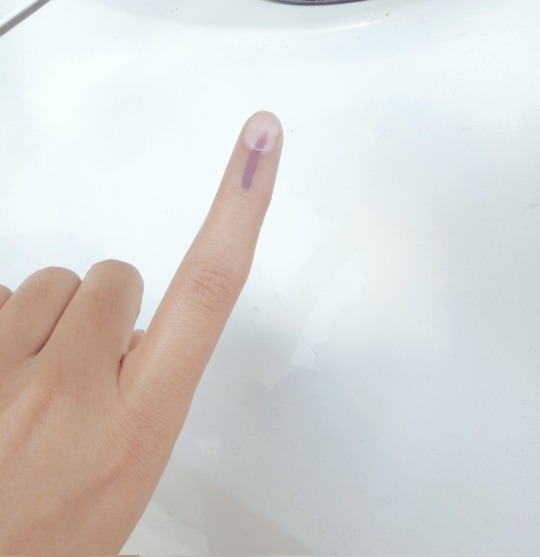
View On WordPress
0 notes
Video
youtube
10 साल में क्या किया Narendra Modi Ji ने उत्तराखंड के लिए
साल 2019 के लोकसभा चुनाव में bharatiya janata party ने सभी पांचों सीटों पर कब्जा जमाया था। narendra modi लहर में BJP को 60.7 प्रतिशत वोट मिले जो वर्ष 2014 के मुकाबले पांच प्रतिशत अधिक थे। इन 10 साल में मोदी जी ने उत्तराखंड के लोगों के लिए क्या क्या किया है! इस वीडियो के माध्यम से जान सकते है!
#youtube#Narendra Modi#BJP Uttarakhand#Uttarakhand Wala Negi#Uttarakhand#Lok Sabha Election#Lok Sabha Election 2024#BJP#BJP 2024
0 notes
Text
Important Announcement: Rescheduling of May 2024 Examinations by ICAI
Introduction: The Institute of Chartered Accountants of India (ICAI) stands as a beacon of excellence in the field of accounting, shaping the future of accounting professionals with its unwavering commitment to examination integrity and fairness. In line with its dedication to transparency and accountability, ICAI regularly updates stakeholders on matters of significance. This announcement…

View On WordPress
#bjp#candidate updates#congress#education#electoral process#examination announcements#examination integrity#examination preparation#examination rescheduling#Fairness#icai#ICAI website#india#Institute of Chartered Accountants of India#Lok Sabha Election#May 2024 examinations#politics
0 notes
Text
Lok Sabha 2024, Congress list of 39 candidates out, Rahul Gandhi fielded from Wayanad, BJP reacts
Ahead of the Lok Sabha election 2024, the Congress has finally released its first list of 39 candidates including former party boss Rahul Gandhi, who has yet again been fielded from Wayanad in Kerala.
Among other prominent names who have been fielded includes parliamentarian Shashi Tharoor, who is contesting yet again from Thiruvananthpuram constituency.
Former Chief Minister Bhupesh Baghel is to contest from Rajnandgaon parliamentary seat, an area where former CM and three times BJP CM Dr Raman Singh has quite an influence.
“I am grateful to the party high command including party president Mallikarjun Kharge, Sonia Gandhi and Rahul Gandhi for giving me the ticket from Rajnandgaon”, he said.
Congress has highlighted the fact that out of 39 names finalized to contest, 61 percent of candidates hail from SC/ST/OBC/ Minority communities.
While 31 percent of these candidates are less than 50 years of age, 52 percent are below 60 years of age.
Source: https://newsplus21.com/lok-sabha-2024-congress-list-of-39-candidates-o/
0 notes
Text
Land For Job Case: ED's Charge Sheet In Land For Job Case, Lalu's Another Daughter Accused | Raj Express
As Lok Sabha elections approach, ED intensifies scrutiny on opposition leaders. The Lalu family is under focus, with the ED filing a charge sheet in the "Land for Job" case at Delhi's Rouse Avenue Court.
youtube
0 notes
Text
Engineer Rashid takes oath as member of 18th Lok Sabha
NEW DELHI — Jailed leader Engineer Rashid took oath as a member of Parliament on Friday after he was released on a two-hour custody parole by the Patiala House court in Delhi. Engineer Rashid was sworn in as a member of the 18th Lok Sabha following his victory from the Baramulla constituency in J&K. He defeated former J&K chief minister and vice president of the National Conference (NC), Omar…
#Abdul Rashid Sheikh#Baramulla Lok Sabha Seat#Engineer Rashid#Engineer Rashid Takes Oath as MP#Jammu and Kashmir (J&K)#Kashmir#Lok Sabha Election#Politics
0 notes
Text
Indian Prime Minister Narendra Modi is, by some measures, the most popular leader in the world. Prior to the 2024 election, his Bharatiya Janata Party (BJP) held an outright majority in the Lok Sabha (India’s Parliament) — one that was widely projected to grow after the vote count. The party regularly boasted that it would win 400 Lok Sabha seats, easily enough to amend India’s constitution along the party's preferred Hindu nationalist lines.
But when the results were announced on Tuesday, the BJP held just 240 seats. They not only underperformed expectations, they actually lost their parliamentary majority. While Modi will remain prime minister, he will do so at the helm of a coalition government — meaning that he will depend on other parties to stay in office, making it harder to continue his ongoing assault on Indian democracy.
So what happened? Why did Indian voters deal a devastating blow to a prime minister who, by all measures, they mostly seem to like?
India is a massive country — the most populous in the world — and one of the most diverse, making its internal politics exceedingly complicated. A definitive assessment of the election would require granular data on voter breakdown across caste, class, linguistic, religious, age, and gender divides. At present, those numbers don’t exist in sufficient detail.
But after looking at the information that is available and speaking with several leading experts on Indian politics, there are at least three conclusions that I’m comfortable drawing.
First, voters punished Modi for putting his Hindu nationalist agenda ahead of fixing India’s unequal economy. Second, Indian voters had some real concerns about the decline of liberal democracy under BJP rule. Third, the opposition parties waged a smart campaign that took advantage of Modi’s vulnerabilities on the economy and democracy.
Understanding these factors isn’t just important for Indians. The country’s election has some universal lessons for how to beat a would-be authoritarian — ones that Americans especially might want to heed heading into its election in November.
-via Vox, June 7, 2024. Article continues below.
A new (and unequal) economy
Modi’s biggest and most surprising losses came in India’s two most populous states: Uttar Pradesh in the north and Maharashtra in the west. Both states had previously been BJP strongholds — places where the party’s core tactic of pitting the Hindu majority against the Muslim minority had seemingly cemented Hindu support for Modi and his allies.
One prominent Indian analyst, Yogendra Yadav, saw the cracks in advance. Swimming against the tide of Indian media, he correctly predicted that the BJP would fall short of a governing majority.
Traveling through the country, but especially rural Uttar Pradesh, he prophesied “the return of normal politics”: that Indian voters were no longer held spellbound by Modi’s charismatic nationalist appeals and were instead starting to worry about the way politics was affecting their lives.
Yadav’s conclusions derived in no small part from hearing voters’ concerns about the economy. The issue wasn’t GDP growth — India’s is the fastest-growing economy in the world — but rather the distribution of growth’s fruits. While some of Modi’s top allies struck it rich, many ordinary Indians suffered. Nearly half of all Indians between 20 and 24 are unemployed; Indian farmers have repeatedly protested Modi policies that they felt hurt their livelihoods.
“Everyone was talking about price rise, unemployment, the state of public services, the plight of farmers, [and] the struggles of labor,” Yadav wrote...
“We know for sure that Modi’s strongman image and brassy self-confidence were not as popular with voters as the BJP assumed,” says Sadanand Dhume, a senior fellow at the American Enterprise Institute who studies India.
The lesson here isn’t that the pocketbook concerns trump identity-based appeals everywhere; recent evidence in wealthier democracies suggests the opposite is true. Rather, it’s that even entrenched reputations of populist leaders are not unshakeable. When they make errors, even some time ago, it’s possible to get voters to remember these mistakes and prioritize them over whatever culture war the populist is peddling at the moment.
Liberalism strikes back
The Indian constitution is a liberal document: It guarantees equality of all citizens and enshrines measures designed to enshrine said equality into law. The signature goal of Modi’s time in power has been to rip this liberal edifice down and replace it with a Hindu nationalist model that pushes non-Hindus to the social margins. In pursuit of this agenda, the BJP has concentrated power in Modi’s hands and undermined key pillars of Indian democracy (like a free press and independent judiciary).
Prior to the election, there was a sense that Indian voters either didn’t much care about the assault on liberal democracy or mostly agreed with it. But the BJP’s surprising underperformance suggests otherwise.
The Hindu, a leading Indian newspaper, published an essential post-election data analysis breaking down what we know about the results. One of the more striking findings is that the opposition parties surged in parliamentary seats reserved for members of “scheduled castes” — the legal term for Dalits, the lowest caste grouping in the Hindu hierarchy.
Caste has long been an essential cleavage in Indian politics, with Dalits typically favoring the left-wing Congress party over the BJP (long seen as an upper-caste party). Under Modi, the BJP had seemingly tamped down on the salience of class by elevating all Hindus — including Dalits — over Muslims. Yet now it’s looking like Dalits were flocking back to Congress and its allies. Why?
According to experts, Dalit voters feared the consequences of a BJP landslide. If Modi’s party achieved its 400-seat target, they’d have more than enough votes to amend India’s constitution. Since the constitution contains several protections designed to promote Dalit equality — including a first-in-the-world affirmative action system — that seemed like a serious threat to the community. It seems, at least based on preliminary data, that they voted accordingly.
The Dalit vote is but one example of the ways in which Modi’s brazen willingness to assail Indian institutions likely alienated voters.
Uttar Pradesh (UP), India’s largest and most electorally important state, was the site of a major BJP anti-Muslim campaign. It unofficially kicked off its campaign in the UP city of Ayodhya earlier this year, during a ceremony celebrating one of Modi’s crowning achievements: the construction of a Hindu temple on the site of a former mosque that had been torn down by Hindu nationalists in 1992.
Yet not only did the BJP lose UP, it specifically lost the constituency — the city of Faizabad — in which the Ayodhya temple is located. It’s as direct an electoral rebuke to BJP ideology as one can imagine.
In Maharashtra, the second largest state, the BJP made a tactical alliance with a local politician, Ajit Pawar, facing serious corruption charges. Voters seemingly punished Modi’s party for turning a blind eye to Pawar’s offenses against the public trust. Across the country, Muslim voters turned out for the opposition to defend their rights against Modi’s attacks.
The global lesson here is clear: Even popular authoritarians can overreach.
By turning “400 seats” into a campaign slogan, an all-but-open signal that he intended to remake the Indian state in his illiberal image, Modi practically rang an alarm bell for constituencies worried about the consequences. So they turned out to stop him en masse.
The BJP’s electoral underperformance is, in no small part, the direct result of their leader’s zealotry going too far.
Return of the Gandhis?
Of course, Modi’s mistakes might not have mattered had his rivals failed to capitalize. The Indian opposition, however, was far more effective than most observers anticipated.
Perhaps most importantly, the many opposition parties coordinated with each other. Forming a united bloc called INDIA (Indian National Developmental Inclusive Alliance), they worked to make sure they weren’t stealing votes from each other in critical constituencies, positioning INDIA coalition candidates to win straight fights against BJP rivals.
The leading party in the opposition bloc — Congress — was also more put together than people thought. Its most prominent leader, Rahul Gandhi, was widely dismissed as a dilettante nepo baby: a pale imitation of his father Rajiv and grandmother Indira, both former Congress prime ministers. Now his critics are rethinking things.
“I owe Rahul Gandhi an apology because I seriously underestimated him,” says Manjari Miller, a senior fellow at the Council on Foreign Relations.
Miller singled out Gandhi’s yatras (marches) across India as a particularly canny tactic. These physically grueling voyages across the length and breadth of India showed that he wasn’t just a privileged son of Indian political royalty, but a politician willing to take risks and meet ordinary Indians where they were. During the yatras, he would meet directly with voters from marginalized groups and rail against Modi’s politics of hate.
“The persona he’s developed — as somebody kind, caring, inclusive, [and] resolute in the face of bullying — has really worked and captured the imagination of younger India,” says Suryanarayan. “If you’ve spent any time on Instagram Reels, [you’ll see] an entire generation now waking up to Rahul Gandhi’s very appealing videos.”
This, too, has a lesson for the rest of the world: Tactical innovation from the opposition matters even in an unfair electoral context.
There is no doubt that, in the past 10 years, the BJP stacked the political deck against its opponents. They consolidated control over large chunks of the national media, changed campaign finance law to favor themselves, suborned the famously independent Indian Electoral Commission, and even intimidated the Supreme Court into letting them get away with it.
The opposition, though, managed to find ways to compete even under unfair circumstances. Strategic coordination between them helped consolidate resources and ameliorate the BJP cash advantage. Direct voter outreach like the yatra helped circumvent BJP dominance in the national media.
To be clear, the opposition still did not win a majority. Modi will have a third term in office, likely thanks in large part to the ways he rigged the system in his favor.
Yet there is no doubt that the opposition deserves to celebrate. Modi’s power has been constrained and the myth of his invincibility wounded, perhaps mortally. Indian voters, like those in Brazil and Poland before them, have dealt a major blow to their homegrown authoritarian faction.
And that is something worth celebrating.
-via Vox, June 7, 2024.
#india#narendra modi#pm modi#modi#bjp#lok sabha elections#rahul gandhi#democracy#2024 elections#authoritarianism#anti authoritarian#good news#hope
747 notes
·
View notes
Text
Haryana Lok Sabha Election 2024
Haryana Lok Sabha Election 2024 का छठा चरण 25 मई को हुआ था। इस चरण में हरियाणा की सभी 10 लोकसभा सीटों पर मतदान हुआ। यहां कुछ महत्वपूर्ण जानकारी है: Haryana Lok Sabha Election 2024: एक महत्वपूर्ण पड़ाव हरियाणा में 2024 का लोकसभा चुनाव नजदीक आ रहा है और यह चुनाव कई मायनों में ऐतिहासिक होने वाला है। हरियाणा, जो हमेशा से ही राजनीतिक दृष्टि से महत्वपूर्ण राज्य रहा है, इस बार भी राष्ट्रीय राजनीति में…
View On WordPress
#election 2024#haryana lok sabha election#lok sabha election#lok sabha election 2024#lok sabha election result 2024#lok sabha elections in india 2024#lok sabha elections in india 2024 dates#result 2024
0 notes
Text
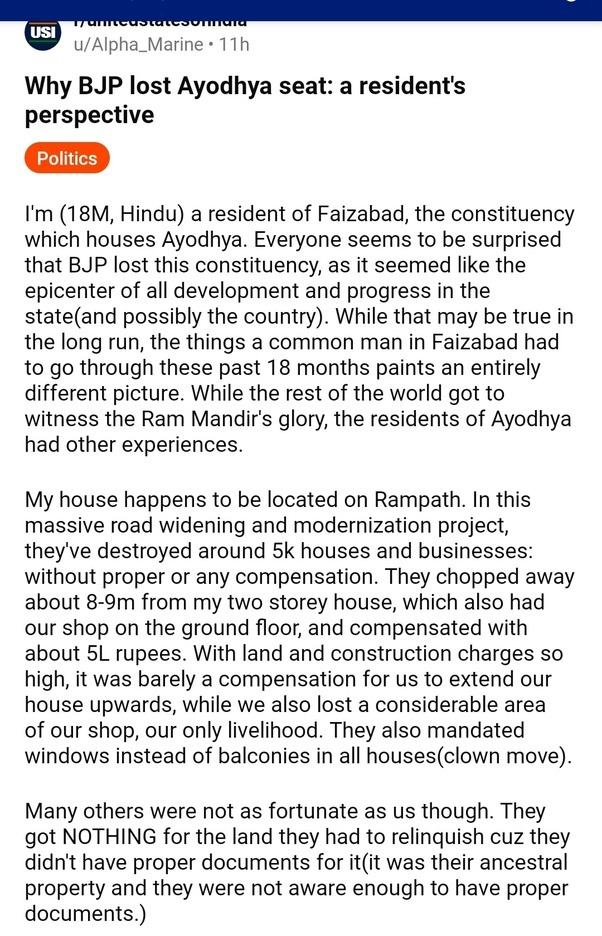
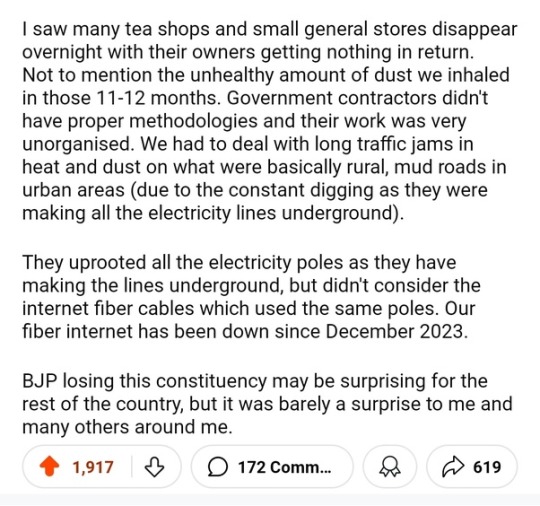
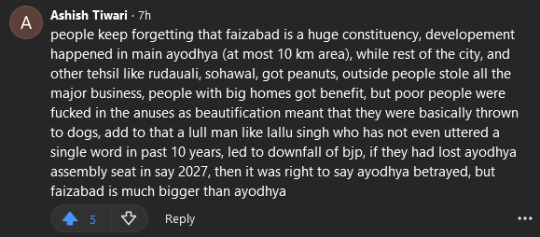
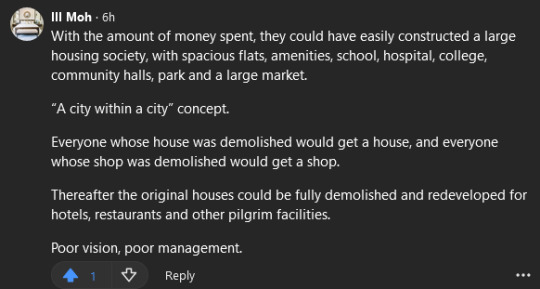
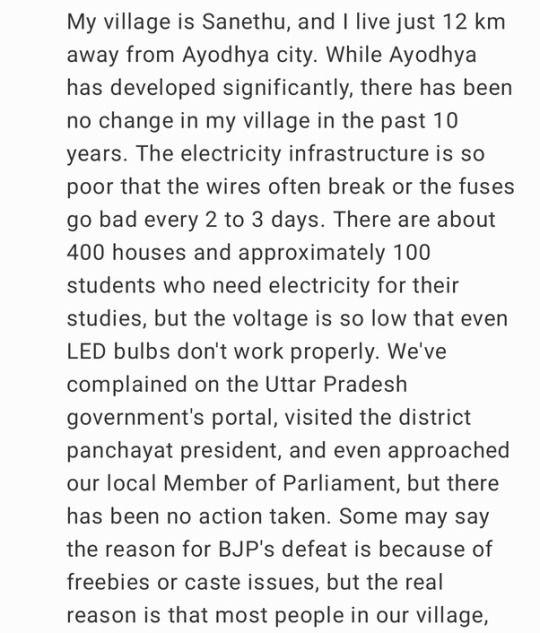
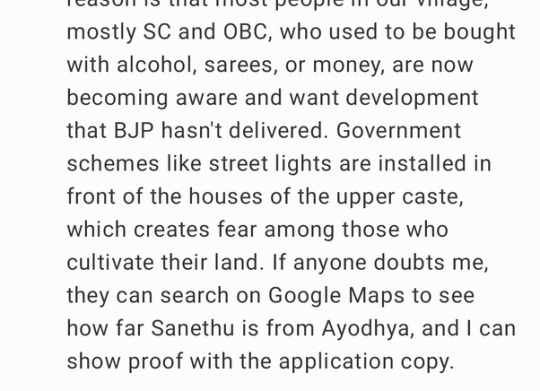
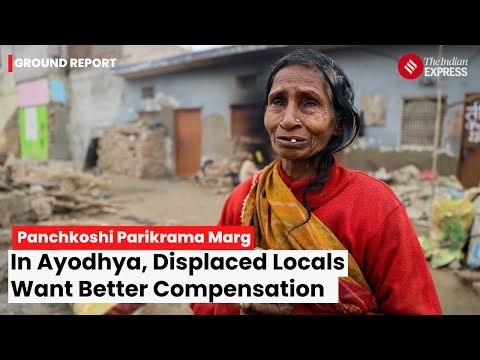
402 notes
·
View notes
Text
Not people saying "disappointed in UP for making the people who brought Lord Ram home lose the elections". AREN'T YOU GUYS THE SAME PEOPLE WHO WERE CURSING ME ABOUT SAYING SOMETHING ABOUT THE RAM MANDIR BY SAYING THAT IT'S A MATTER OF FAITH AND NOT POLITICS? At least stick to your own arguments, lmao.
-Mod S
#desiblr#hindublr#indian politics#indpol#india#indian elections#lok sabha elections#lok sabha 2024#mod: s
257 notes
·
View notes